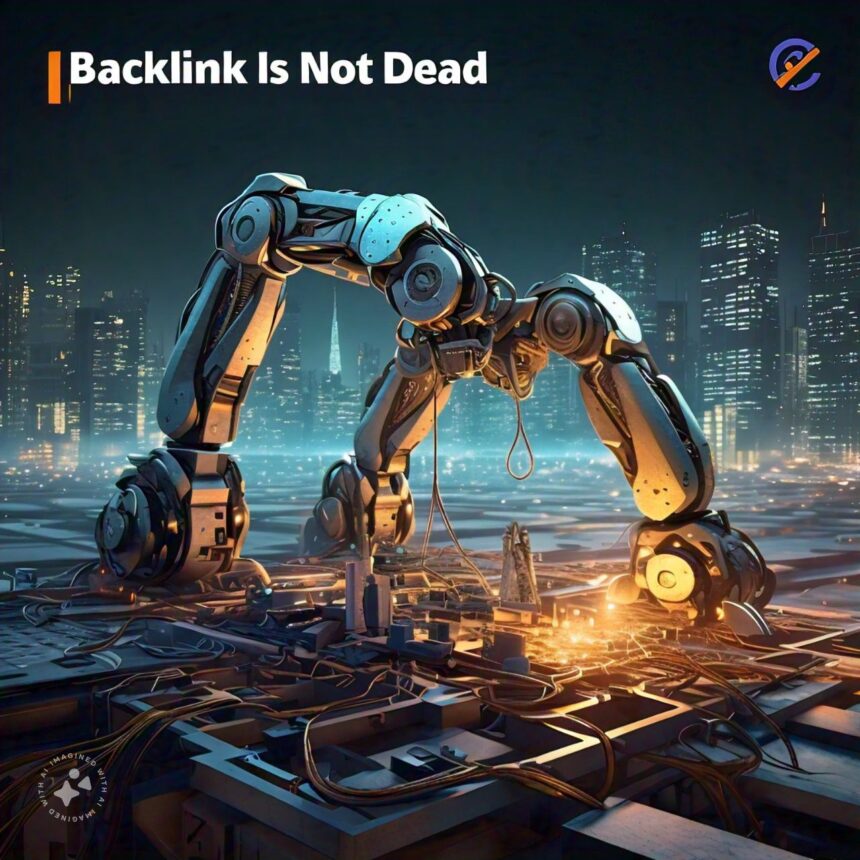In the ever-evolving world of Search Engine Optimization (SEO), strategies come and go, and the relevance of certain techniques is frequently debated. One such debate is whether link building, particularly earning backlinks, still plays a crucial role in SEO. Despite numerous claims that “backlink is dead,” the truth is far from it. Backlinks remain a key factor in how search engines evaluate the authority, trustworthiness, and overall ranking potential of a website.
In this article, we will explore why link building is not dead and why it is still vital for successful SEO. We’ll also look at how link building strategies have evolved, and what businesses can do to ensure they are leveraging backlinks effectively as we move into the future of SEO.
1. The Core Value of Backlinks: Authority and Trust
Backlinks, which are links from one website to another, have been a cornerstone of SEO since the early days of Google. The concept is simple: if a trusted website links to yours, it’s an endorsement of your content, which signals to search engines that your website is credible and valuable. This “vote of confidence” is what has made link building so crucial for ranking algorithms.
– Why Backlinks Remain Relevant
Despite evolving algorithms, search engines still use backlinks as a primary signal of a website’s authority. This is because backlinks are difficult to manipulate authentically compared to on-page optimization tactics like keyword stuffing. High-quality backlinks from authoritative sites are an indication that your content is worth sharing, which helps search engines determine its relevance to users’ queries.
As Google’s algorithm has become more sophisticated, it can distinguish between high-quality and low-quality backlinks, prioritizing organic, contextually relevant links. This means that while the tactics of link building may have changed, the core importance of earning quality backlinks remains strong.
2. The Evolution of Link Building Strategies
While backlinks are not dead, the strategies for acquiring them have evolved significantly. In the early 2000s, it was common to see link farms, automated backlink generation, and spammy tactics dominate the SEO world. However, search engines, particularly Google, have become much better at filtering out manipulative links and penalizing websites that use such tactics.
– Quality Over Quantity
One of the biggest shifts in link building is the emphasis on quality over quantity. Today, earning a few high-quality backlinks from authoritative, relevant websites can be far more beneficial than hundreds of low-quality links. Search engines now focus on the context in which a link appears and the relevance of the linking site. This means that effective link building requires relationship-building, content marketing, and creating link-worthy resources.
– Natural and Organic Backlinks
Link building strategies have also shifted towards earning natural, organic backlinks. This means that rather than seeking to “create” links artificially, businesses must produce valuable content that attracts links naturally. Infographics, data-driven research, and in-depth guides are examples of content that other websites may want to link to as references, contributing to natural link building.
– Editorial Links vs. Paid Links
Another important evolution is the focus on editorial links—those given freely by another site because of the value of your content. Unlike paid links, which can be penalized if not properly disclosed (e.g., with “nofollow” or “sponsored” tags), editorial links carry more weight. The emphasis on earning editorial links underscores the importance of quality content, relationship building, and digital PR efforts to earn credibility in your niche.
3. Backlinks as a Measure of Expertise, Authoritativeness, and Trustworthiness (E-A-T)
One of the most important updates to Google’s evaluation criteria is the emphasis on E-A-T: Expertise, Authoritativeness, and Trustworthiness. Backlinks play a critical role in establishing E-A-T.
– Demonstrating Expertise and Authority
When an authoritative site links to your content, it essentially vouches for your expertise. This is especially important in industries like finance, health, and law, where credibility is critical. For example, a health website that receives backlinks from medical institutions or respected professionals is seen as more authoritative and trustworthy.
– Building Trust with Quality Backlinks
The trust factor is paramount for SEO, and backlinks are one of the strongest indicators of trustworthiness. The sources that link to your site should themselves be trusted and relevant. Backlinks from spammy or irrelevant sites can damage your reputation in the eyes of search engines, whereas links from well-known, respected websites help establish your site as a reliable source of information.
4. The Role of Backlinks in User Discovery and Referral Traffic
Beyond SEO, backlinks play a major role in driving referral traffic and enhancing user discovery. A backlink from a high-authority website can result in significant referral traffic, helping you reach new audiences.
– Referral Traffic as an Indicator of Link Value
The value of a backlink is not solely about its effect on SEO. If your link appears on a popular blog or news outlet, it can drive a substantial amount of traffic directly to your website. This kind of referral traffic can be highly valuable, as it often consists of users who are genuinely interested in your content or services.
– Strategic Link Placement
Strategically placing links in high-traffic areas where your target audience spends time can improve brand visibility and engagement. This could be an industry forum, a niche blog, or a respected online publication. The key is to focus on websites that are relevant to your niche and have an audience that could benefit from your content.
5. Content Marketing and Link Building: A Symbiotic Relationship
Content marketing and link building have become inextricably linked. Creating high-quality content is one of the most effective ways to attract backlinks naturally, and at the same time, link building efforts are enhanced by distributing and promoting this content.
– Creating Link-Worthy Content
To attract quality backlinks, content must be informative, engaging, and unique. Types of content that tend to attract backlinks include:
- Original Research: Data-driven research, surveys, and studies that provide unique insights into your industry.
- Infographics: Visual representations of data can be highly shareable and can attract links from other sites that find them useful.
- In-Depth Guides: Comprehensive guides that provide valuable information are often linked to by others as resources for their audience.
– Guest Posting and Collaborations
Guest posting is another powerful link building strategy that has evolved significantly. Instead of using guest posts to gain numerous low-quality backlinks, it is now essential to focus on contributing to high-authority websites in your industry. By collaborating with other reputable sites, you not only gain backlinks but also increase brand exposure and establish relationships with influential people in your niche.
6. Digital PR and Link Building
Digital PR has become a key component of modern link building strategies. By reaching out to journalists, bloggers, and influencers, you can earn high-quality backlinks from news outlets and authoritative sites.
– Gaining Media Coverage
Creating newsworthy content—such as press releases, research findings, or innovative projects—can help you gain coverage in media outlets. This coverage often includes backlinks, which are valuable not only for their authority but also for the trust and credibility they confer.
– Influencer Partnerships
Partnering with influencers can also help generate backlinks. When influencers in your niche mention your content, products, or services on their blogs or websites, it can create high-quality backlinks and increase brand awareness. The key to success here is choosing influencers whose audience aligns with your target market and whose endorsements carry weight.
7. The Future of Link Building: Adaptation and Sustainability
The future of link building will be characterized by adaptability and a focus on sustainable, white-hat practices. As search engines continue to improve their algorithms, only the most genuine, value-driven link building strategies will remain effective.
– AI and Link Building
AI-driven tools are playing an increasing role in link building. Tools that analyze backlink profiles, identify opportunities for outreach, and monitor the quality of links can help businesses stay ahead. AI can also assist in identifying authoritative websites, suggesting relevant content for outreach, and even predicting which websites are most likely to link back to your content.
– Building Real Relationships
The future of link building is about building real, meaningful relationships within your industry. Outreach is no longer a numbers game but rather about engaging with relevant websites that are genuinely interested in what you have to offer. Taking the time to understand their content, personalizing your outreach, and demonstrating why linking to your content adds value will be key to earning quality backlinks.
– Diversifying Your Link Profile
Diversification will be important in ensuring a robust backlink profile. This means earning links from a variety of sources—blogs, news websites, forums, industry directories, and even social platforms. A diverse backlink profile appears more natural to search engines and is less likely to be negatively impacted by future algorithm updates.
Backlinks Are Here to Stay
Despite the claims that “backlink is dead,” the reality is that backlinks remain one of the most important factors in determining a website’s authority, trustworthiness, and search engine rankings. What has changed is how we approach link building—quality, relevance, and authenticity are now the driving forces behind successful link building campaigns.
Backlinks are not only crucial for Google but are also highly important for other search engines like Bing and DuckDuckGo. Bing, for example, places significant emphasis on backlinks when determining a site’s authority, similar to Google. Additionally, Bing also considers social signals in their ranking criteria, which means that engaging content that is widely shared can improve rankings even further. DuckDuckGo, a privacy-focused search engine, also relies heavily on traditional SEO factors like backlinks, as it does not use personalization for ranking results. This makes high-quality backlinks a major component of how DuckDuckGo determines which content to display prominently in search results.
The key to future-proofing your link building efforts lies in focusing on quality over quantity, creating valuable content that attracts natural links, leveraging digital PR, and building real relationships within your industry. As search engines continue to refine their algorithms to better serve users, the value of genuine, authoritative backlinks will only increase.
Link building is far from dead—it’s evolving. Businesses that adapt to these changes and take a strategic, sustainable approach to link building will continue to benefit from improved visibility, authority, and user engagement in the years to come.


